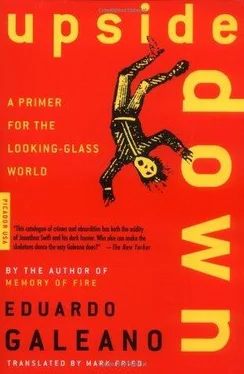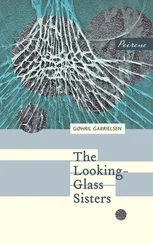Over half of Hollywood’s earnings already comes from foreign markets, sales that grow spectacularly year by year, while the Oscars attract a universal viewership comparable only to that drawn by soccer’s World Cup or the Olympics. The powers that be are no dummies; they know that imperial power largely rests on the unfettered spread of emotion, on illusions of success, symbols of strength, orders to consume, and elegies to violence. In the film Close to Eden by Nikita Mikhalkov, the peasants of Mongolia dance to rock music, smoke Marlboros, wear Donald Duck hats, and surround themselves with images of Sylvester Stallone as Rambo. That other great master of the art of pulverizing your neighbor, the Terminator, is the character most admired by the children of the world: a 1997 UNESCO poll taken simultaneously in Europe, Africa, Asia, and Latin America found that nine out of ten children identified with that musclebound purveyor of violence played by Arnold Schwarzenegger.
In the global village of the mediated universe, all continents flow together and all centuries occur at once. “We are from here and from everywhere at the same time, which is to say, from nowhere,” says Alain Touraine about television. “Images, always attractive to the public, juxtapose gas station jockeys and camels, Coca-Cola and Andean villages, blue jeans and an imposing castle.” Believing themselves condemned to choose between copying and casting themselves adrift, many local cultures, off-balance, torn loose, fading away, take refuge in the past. With desperate frequency, cultures seek shelter in religious fundamentalism or other absolute truths; they propose a return to times gone by, the more puritanical the better, as if there were no other response to overpowering modernity than intolerance and nostalgia.
The Spectacle
A criminal trial was the most successful product sold by U.S. television in 1995. The trial of former athlete O. J. Simpson, charged with two murders, filled the networks’ programming hours with innumerable episodes that won the fervent allegiance of the television audience.
Crime as spectacle: every one of the trial’s many actors played a role, and acting, good or bad, was more important than the guilt or innocence of the defendant, the validity of the charges, the propriety of the investigation, or the truth of the testimony. In his free time, the judge instructed other judges in the secret arts of playing a convincing judge on camera.
The Cold War has been left behind. Without it, the so-called free world has lost its magical justification for a holy crusade against the totalitarianism that until a short while ago ruled the countries of the East. Yet it grows more evident every day that communications manipulated by a handful of giants can be just as totalitarian as communications monopolized by the state. We are all obliged to accept freedom of expression as freedom of business. Culture is reduced to entertainment, and entertainment is a brilliant global enterprise. Life is reduced to spectacle, and spectacle is a source of economic and political power. News is reduced to advertising, and advertising rules.
Two out of three human beings live in the so-called Third World, but two out of three correspondents of the biggest news agencies work in Europe and the United States. What happened to the free flow of information and the respect for diversity enshrined in international treaties and praised in the speeches of political leaders? Most of the news the world receives comes from and is directed at a minority of humanity — understandably so from the point of view of the commercial operations that sell news and collect the lion’s share of their revenue in Europe and the United States. It’s a monologue by the North. Other regions and countries get little or no attention, except in the case of war or catastrophe, and then the journalists covering the story often don’t speak the language or have the least idea of local history or culture. News tends to be dubious and sometimes plainly, simply wrong. The South is condemned to look at itself through the eyes of those who scorn it.
In the early eighties, UNESCO proposed an initiative based on the truth that news is not a simple commodity but a social right and that the communications media should bear responsibilities commensurate with the educational purpose they serve. UNESCO set out to create an independent international news agency working from the countries that suffer the indifference of the factories of information and opinion. Even though the proposal was framed in ambiguous and cautious terms, the U.S. government thundered furiously against such an attack on freedom of information. What business did UNESCO have sticking its nose into matters pertaining to the living forces of the market? The United States walked out of UNESCO, slamming the door, as did Great Britain, which tends to act as if it were a colony of the country that was once its colony. At that point the idea of promoting international news unhampered by political or commercial interests was shelved. Any attempt to gain independence, timid as it may be, threatens the international division of labor by which a handful of people actively produce news and opinion and the rest of us passively consume it.

Little is said about the South, and never or almost never from the South’s point of view. In general, mass media news of the South reflects the prejudices of an outsider looking on from above and beyond. Between ads, television tends to stick to images of hunger and war. These horrors, these “fatalities,” occur in a hellish underworld and serve only to emphasize the paradise of consumer society, which offers cars to suppress distance, facial creams to suppress wrinkles, dyes to suppress gray hair, and pills to suppress pain, among its many suppressive marvels. Frequently, those images of the “other” world come from Africa. African hunger is portrayed as a natural catastrophe, and African wars are strictly “a black thing,” bloody rituals of “tribes” who have a savage habit of cutting one another to pieces. Images of hunger never allude, not even in passing, to colonial pillage. Never do they mention the responsibility of Western powers that yesterday bled Africa through the slave trade and single-crop plantations and that today perpetuate the hemorrhage through hunger wages and ruinous prices. The same is true of news about wars; there is always the same silence about the colonial legacy, always the same impunity for the white boss who mortgaged Africa’s independence, leaving in his wake corrupt bureaucracies, despotic military officers, artificial borders, and mutual hatred. And always the same omission of any reference to the northern industry of death that sells the weapons that so encourage the South to go on killing itself.
The Information Age
Just before Christmas 1989, we all viewed horrendous evidence of the killings ordered by Nicolae Ceauşescu in Romania.
The crazed despot who liked to be called the “Blue Danube of Socialism” killed four thousand dissidents in the city of Timişoara. We saw many of the bodies, thanks to the global reach of television and the good work of the international agencies that feed images to newspapers and magazines. Long rows of dead bodies, deformed by torture, shocked the world.
Later some papers published a correction, though not many read it. Killings had indeed occurred at Timişoara, but the victims numbered about a hundred and included some of the dictatorship’s henchmen. What’s more, those hair-raising images had been staged. The bodies had nothing to do with the story and were disfigured not by torture but by the passage of time. The news factories unearthed them from a cemetery and had them pose for the camera.
Читать дальше












